In part two of our series, Amanda Meade asks if the broadcaster is dumbing down just when it should be muscling up
The
ABC is poised to launch a new service that is likely to surprise its
loyal audience and provoke its competitors and critics. It’s not a
hard-hitting new investigative series or radio feature, but a dive into
lifestyle journalism.
ABC Life will cover topics not traditionally covered online by the ABC in a comprehensive way, including work and career, sex and relationships, fashion and personal grooming, travel and adventure, food and cooking, home and family, and pets. As well there will be new digital treatment of health, wellbeing and fitness, personal finance, consumer rights and gardening.
The new venture comes as those who excel at the ABC’s traditional news and current affairs and specialist programming feel increasingly “spooked” by constant political pressure, management instability and cuts to programs and staff. At a time when the national broadcaster should be muscling up, it is directing resources into what some say is a dumbing down.
ABC Life also puts the ABC more sharply in direct competition with the extensive lifestyle coverage in the commercial media across digital outlets. The Sydney Morning Herald and the Age, soon to be swallowed up by Nine in a major media merger, target a similar upscale demographic to the ABC. News Corp wants the ABC’s online activities curbed.
With a price tag of $8m, ABC Life emerged from managing director Michelle Guthrie’s first strategic move to streamline the bureaucracy to free up funds for content. The Great Ideas Grant, or Gig, was opened to staff in 2017 to pitch their ideas for a $50m content fund which was created through the loss of 200 jobs in the TV news, television and content divisions.
The secret project, described as “your guide to a better life for you and those you love” is key to Guthrie’s push to offer more user-friendly content online and on mobile devices, to expand the ABC’s reach and to attract a younger audience. The 25- to 54-year-olds are the holy grail for a public broadcaster whose audience skews old.
There’s a big team of 25 dedicated reporters, graphic designers, video producers, editors and social media producers. At least 18 of them were specifically hired for the site, and the jobs ads didn’t go unnoticed by some of the seasoned journalists, producers and camera operators who have been retrenched.
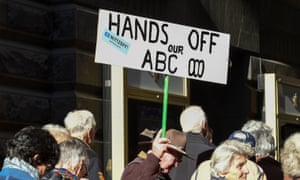
ABC Life will cover topics not traditionally covered online by the ABC in a comprehensive way, including work and career, sex and relationships, fashion and personal grooming, travel and adventure, food and cooking, home and family, and pets. As well there will be new digital treatment of health, wellbeing and fitness, personal finance, consumer rights and gardening.
The new venture comes as those who excel at the ABC’s traditional news and current affairs and specialist programming feel increasingly “spooked” by constant political pressure, management instability and cuts to programs and staff. At a time when the national broadcaster should be muscling up, it is directing resources into what some say is a dumbing down.
ABC Life also puts the ABC more sharply in direct competition with the extensive lifestyle coverage in the commercial media across digital outlets. The Sydney Morning Herald and the Age, soon to be swallowed up by Nine in a major media merger, target a similar upscale demographic to the ABC. News Corp wants the ABC’s online activities curbed.
With a price tag of $8m, ABC Life emerged from managing director Michelle Guthrie’s first strategic move to streamline the bureaucracy to free up funds for content. The Great Ideas Grant, or Gig, was opened to staff in 2017 to pitch their ideas for a $50m content fund which was created through the loss of 200 jobs in the TV news, television and content divisions.
The secret project, described as “your guide to a better life for you and those you love” is key to Guthrie’s push to offer more user-friendly content online and on mobile devices, to expand the ABC’s reach and to attract a younger audience. The 25- to 54-year-olds are the holy grail for a public broadcaster whose audience skews old.
There’s a big team of 25 dedicated reporters, graphic designers, video producers, editors and social media producers. At least 18 of them were specifically hired for the site, and the jobs ads didn’t go unnoticed by some of the seasoned journalists, producers and camera operators who have been retrenched.

The ABC’s chief finance and strategy officer, Louise Higgins, rejects criticism of ABC Life as “light and fluffy” and likens it to what is already available on ABC local radio.
“Australians trust the ABC, not just on the hard-hitting news, but they trust us to tell them about the broader things that matter in their lives, free of commercial influence,” Higgins said. “There is no dumbing down here. We have always told Australians about things that matter to them.”
But there are staff who believe the push to attract younger audiences with BuzzFeed-style quizzes and lighter entertainment and lifestyle content on the ABC website will alienate traditional supporters. The news websites do appear to contain lighter fare than radio or TV programs and are poorly edited.
In Radio National, resources have been stripped from distinctive long-form radio documentary and features. The documentary feature program Earshot has been reduced from four hours a week to just one. Sources say the country’s best documentary radio makers have been told to make “more personal interest, more personal journey stories” and fewer social, history and philosophy documentaries.
And while the ABC’s flagship current affairs program, Four Corners, has had its budget boosted and is going from strength to strength, current affairs programming – which the public loves and trusts about the public broadcaster – has taken a significant hit overall.
Mark Scott axed the state editions of the 7.30 program and Guthrie cancelled Lateline and trimmed an hour a day off radio current affairs programming. Foreign Correspondent has had its season and length trimmed every year and staff fear it will be the next program to disappear completely.
ABC television is arguably the most challenged of all the content divisions. Despite successes such as Mystery Road and You Can’t Ask That, TV has diminishing funds and shrinking audiences. The broadcaster told a parliamentary inquiry the number of hours of drama has dropped by 20% since 2014, factual programming by 60% since 2014 and documentary by 13.5%.
At the time the head of the Screen Producers Association, Matthew Deaner, warned that this could mean that the ABC would no longer be the home of Australian stories. If it continued, he said, “the ABC will lose its way”.
Disruption and second-guessing
Transformation is necessary in a disrupted media landscape. The ABC does have to be on all platforms where the audience is, especially the younger ones who are retreating from linear, or programmed, television. Former managing director Mark Scott began this digital transition during his 10 years in the job and under Guthrie it has continued. Both bosses have had to do more with less.But as the ABC expands into new digital spaces and platforms and hires a new generation of staff with different skills, the ABC’s culture – and knowledge base – is being transformed.
Meanwhile, all this change has been accompanied by extraordinary external pressure and constant complaints of bias.
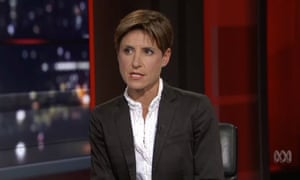
The internal review – which looked at specific stories and checked for tone and language – fuelled the sense that at the ABC, you have to mind your tongue. Especially now.
This atmosphere of fear in which critics in the press or the government are waiting to pounce on a wrong word or tone has, according to some ABC staffers, fostered a culture of anxiety and a second guessing of how a story or a program will be received.
“Frankly, we are all spooked by everything in here,” one on-air presenter told Guardian Australia. Across news, radio and TV there is a concerted push from managers to find conservative voices to keep the accusation of leftwing bias at bay.
But it’s a case of “damned if you do, damned if you don’t” and charges of bias cut both ways. There’s been a perception, for example, that members of the rightwing think tank the Institute of Public Affairs, funded largely by billionaire mining magnate Gina Rinehart, get undue exposure across programs such as The Drum, Q&A and on the radio networks. But Drum host Julia Baird says the impression that the IPA is on her show often is dead wrong and the group has appeared only three times this year.
Media academic Denis Muller says robust editorial leadership is essential at a time like this. “Middle-level editors and the staff journalists who work for them start looking over their shoulders, tempted to take easy options and avoid possible heat. The easiest option is self-censorship, dodging sensitive stories, leaving out material or watering it down,” Muller wrote in the Conversation.
The ABC’s usually robust news leadership was called into question with the handling of The Cabinet Files, a series of exclusive stories sourced from a cache of cabinet documents obtained by the ABC after they were found in a filing cabinet.
Senior ABC staff were dismayed when the ABC news director, Gaven Morris, made an agreement with the Department of Prime Minister and Cabinet to return the documents.
They told Guardian Australia there was consternation over what they believed was a lack of rigour in editorial oversight and an unwillingness to share the material with journalists who were best equipped to deal with it. Was ABC management jumping at shadows to appease a hostile government?
But unlike Scott, Guthrie doesn’t come from a journalism background, and her two-year tenure has been marked largely by an unwillingness to engage. Almost everyone who has met her agrees the former Google executive is a likeable, highly personable and smart woman. But many feel she hasn’t dealt well with the vast remit of public broadcasting and lacks a public service ethos. “She’s a lawyer and a dealmaker, that’s her skill,” one said.
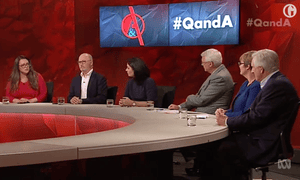
“She really didn’t get the organisation when she arrived,” said another. “It was a lot bigger and a lot more complex that what she understood. I think she had difficulty finding a frame of reference to contextualise things that happened.” In 2016 she had a disastrous encounter with Radio National, which had just suffered big cuts. She asked them how they “justify their massive budget when their reach is so low”. She followed that up by asking Four Corners staff why they didn’t do more positive business stories.
Guthrie, who spent much of her career as an executive for Rupert Murdoch’s global television empire, and reportedly took a pay cut to leave Google for her $900,000 a year ABC role, rarely gives interviews. According to sources, she is not spotted around the ABC offices in the way previous managing directors have been, and has become what some internally have dubbed “an invisible MD”.
Higgins, the former chief operating officer of Lachlan Murdoch’s Nova Entertainment, says if Guthrie is not “visible” it’s because she has her head down working and it is very unfair criticism.
Higgins says the worst is over and the new structure “repositions us as content makers to be better positioned for the future”, listing the programs Stargazing and War on Waste as examples of content that has spread across all platforms “in a one-ABC-type way”.
But many sources have called the restructure a disaster. After travelling around looking at broadcasting models overseas and hiring consultants, Guthrie settled on a reorganisation of the ABC along genre lines to remove the historic division between television and radio. Now some staff say they are reporting to people who have no experience in their craft.
“The ABC is now run by managers who have never been content makers,” one radio producer says.
“It’s become very clear that this does matter because they appear to have absolutely no idea, and also no interest, in how content is made. The level of respect for content makers is at an all-time low. This is demonstrated by the manner in which content makers are referred to as ‘units’ to be shuffled around at any time to any place.”
Management reviews have resulted in the cream of talent leaving in waves: award-winning radio features producers were removed from Radio National, highly skilled TV and radio reporters were made redundant in newsrooms in every state and camera operators and journalists with decades of experience were deemed not to have the skills needed for a digital newsroom. The ABC has also been breaking up its historic music and reference libraries, making 10 librarians redundant and digitising only a fraction of the unique collection.
“There is also massive inefficiency in units where experienced staff are ditched for inexperienced staff who take longer to do a job because they don’t know how to do it, and they have no one to learn from,” one producer says. “The contempt of managers for older experienced staff has become a culture which has flowed out into the work floor and there’s now a generational divide.”
Since 2014, more than 1,100 ABC staff have been retrenched – that’s one quarter of the workforce – and most of the retrenchments were older, experienced staff. A great deal of skills and knowledge has walked out the door and repeated restructures have ensured staff morale is at an all-time low.
‘Corporate doublespeak is off the charts’
Guthrie’s softly-softly approach to the barrage of criticism from the government over its complaints about news and comedy shows was perceived to have misfired.At the first budget estimates committee after the budget, where the ABC was expected to fire up about the cuts, Guthrie surprised many by informing the committee she was unable to attend due to a “significant family commitment”. It was particularly unfortunate, given the ABC’s long-term government relations manager, Michael Millett, was on extended leave for a serious illness.
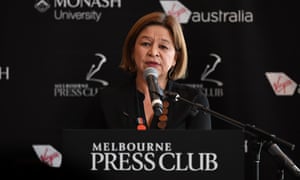
The family commitment turned out to be her oldest daughter’s graduation in Singapore, a city she visits regularly because her husband, chef Darren Farr, has a restaurant there. Higgins appeared in her absence and was a strong performer.
“Estimates was the time when Michelle should have been very visible and the organisation should have seen her,” a former ABC executive said.
“She had one job,” said another staffer.
Multiple sources told Guardian Australia Guthrie spends more than the usual amount of time out of the office and makes frequent trips to Singapore. For the past year she has been an independent non-executive director of Singapore telco StarHub.
“Ms Guthrie’s role as an independent non-executive director of StarHub is a matter of public record. External commitments are performed using personal leave.”
Guthrie has improved her standing and somewhat turned things around in recent months. She was applauded when she gave a stirring Melbourne Press Club speech in defence of the ABC, saying Australians didn’t want it used as a punching bag.
The people of Australia, she said, “regard the ABC as one of the great national institutions and deeply resent it being used as a punching bag by narrow political, commercial or ideological interests”.
The opposition communications spokeswoman, Michelle Rowland, thinks Guthrie is doing a good job but she is concerned about staff morale. “I don’t think it’s a secret that staff morale and career progression at the ABC has been taking big hits, compounding what would have been a tumultuous time of restructuring,” she says.
“That’s a serious long-term problem when you consider the greatest asset of any successful organisation is its people, and the sector needs people who are brave and creative.”
Union leader Sinddy Ealy, who represents the majority of ABC staff through the Community and Public Sector Union, says the ABC’s culture has changed since 2014 and too much corporate memory has been ripped out.
“Many staff are fighting hard to resist attempts to dumb down the content and the quality of the ABC but it’s hard to stand up to a leadership that is intent on silencing dissent within the organisation,” Ealy says.
According to an engagement survey, staff satisfaction fell from 52% in 2015 to 46% this year. Sources say the ABC board was horrified and the leadership team held meetings with staff to work out what had gone wrong.
Sinddy Ealy: “It’s the worst I’ve seen it more than a decade. Two years ago the ABC executive were slammed by ABC staff in their biennial staff engagement survey for the way they were running down the ABC and conducting themselves. At that time, the senior leadership came out promising to take all of the feedback on board and change the way they do things. Yet here we are, two years on under Michelle Guthrie, and it’s gotten even worse.”
Guthrie’s term has been marked by what some see as an importation of Google culture in the form of corporate jargon and double-speak.
The leadership team has run programs such as Bureaucracy Stop, Efficiency Project and Great Place to Work, which have elicited a lot of eye rolling. One division was asked to “implement an Activity Analysis exercise involving all our finance employees self-reporting their activities over a 3-week period, in a structured format”. In other words, they had to record what they did every minute for three weeks.
When the ABC axed The Checkout, the ABC’s corporate Twitter account said “The ABC has not axed The Checkout”. An announcement to cull 22 jobs in news was framed as “Stronger local journalism for state and territory audiences”.
Says Ealy: “The level of corporate doublespeak is off the charts, which is ironic given how hard the ABC takes other organisations to task for not speaking truthfully. I also think the public service ethos is vanishing from the upper echelons of the organisation. Paying it lip service in public forums is very different to imbibing it into the day to day operations of the ABC.”
At a recent ABC Friends rally, the ABC broadcaster Phillip Adams – with his usual dramatic flair – asked the audience to be silent for one minute “to think about what the ABC means to us”.
It was in part a light-hearted dig at instructions from ABC management to staff not to “cross the line into campaigning for or against any political party or politician, or taking sides in a controversial public debate about funding, charter, privatisation or any other aspect of the debate”.
After the minute’s silence, Adams said: “Now, imagine that silence lasting five minutes, half an hour, an hour, a day, a week, a month, just lasting, going on and on and on. Because that is, in my view, a very real threat.”
Adams said the commercial media, filled with voices such as Alan Jones and Ray Hadley, would never tackle “any of the things we do” or tell any of the stories the ABC does. Without the ABC, the silence would continue.
“This is the 11th hour for this organisation. How would that silence be filled?”
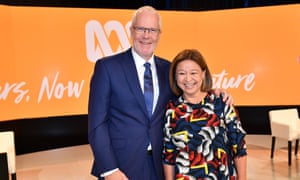
No comments:
Post a Comment